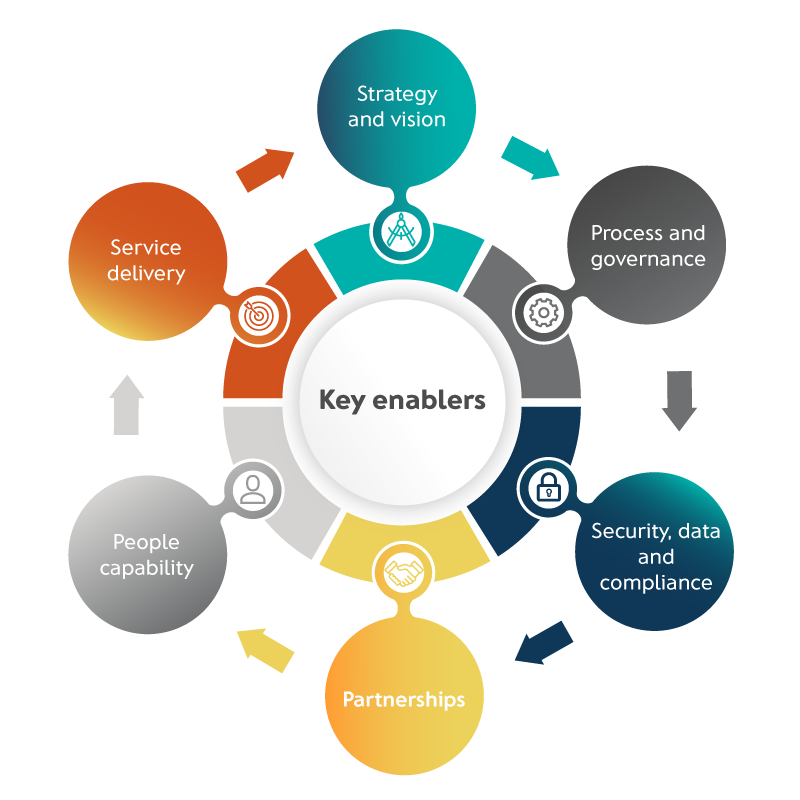We often advise HR teams that there is no one-size-fits-all solution for your decision on HRIS support models. Much will depend on your business requirements, but it is important to note that establishing a business-as-usual (BAU) HRIS support model is essential for any HR cloud software implementation and its ongoing support. This ensures the business has the necessary people capability, clearly defined roles, processes, governance framework, and a well-defined roadmap in place, enabling the team to maximise the return on investment from current and future HR products and capabilities.
In our latest blog, we compared ‘do-it-yourself’ HRIS support with using an Application Managed Service (AMS) provider, weighing the pros and cons of each. Next, we tackled the debate: Should HR or IT handle your HRIS? Now, we’re exploring the benefits and challenges of outsourcing HRIS support to an AMS provider, plus the key questions to ask before deciding.
Advantages of an AMS provider
Partnering with an AMS provider offers significant advantages for organisations looking to complement their HRIS support model, including:
- Cost savings: Outsourcing to an AMS provider typically requires a lower initial investment compared to building an in-house support team. Additionally, AMS providers often offer flexible pricing models, such as a fixed, predictable subscription for a set number of support hours per month, allowing businesses to manage costs efficiently.
- Access to expertise: AMS providers bring deep expertise in HR technology and ongoing system maintenance. Their teams stay up to date with the latest industry trends, compliance requirements and mandatory product updates, ensuring that HRIS platforms remain optimised and compliant at the same time as enhancing system performance and user experience. This also reduces the risk of ‘losing’ key expertise post ‘training’ new resources up.
- Scalability and flexibility: An AMS partnership enables organisations to scale resources based on business needs, aligning support with roadmap priorities and key initiatives. This flexibility ensures continuous system improvements, enhances efficiency, and helps businesses adapt to evolving requirements without overextending internal teams.
- Improved service continuity and risk mitigation: AMS providers can offer 24/7 support, disaster recovery planning and proactive monitoring, reducing the risk of system downtime or service interruptions. By leveraging dedicated support teams and predefined SLAs, organisations can ensure business continuity and minimise disruptions, even during periods of significant change, staff turnover or unexpected challenges.
Challenges with an AMS provider
While partnering with an AMS provider offers significant benefits, there are also potential challenges to consider, including:
- Service provider dependency: Outsourcing HRIS support can lead to increased reliance on the provider’s expertise, which may impact availability, responsiveness and strategic alignment. Additionally, organisations may struggle with building in-house capabilities, reducing self-sufficiency over time.
- Lack of dedicated resources: Although AMS providers offer scalability, they may not always guarantee consistent resource allocation for your specific needs. This can result in frequent interactions with different consultants, leading to inefficiencies and the need to repeatedly explain context and ongoing issues.
- Innovation constraints: AMS providers prioritise system stability and routine maintenance, which can sometimes come at the expense of proactive innovation and continuous improvement. While they stay informed on new product features and updates, their primary focus is often on keeping systems operational, rather than driving transformative enhancements and linking this to the broader people and business strategy needs.
- Control and visibility: Outsourcing support functions may result in a loss of direct oversight and reduced visibility into day-to-day system management. Organisations may face challenges in maintaining control over decision-making, system optimisations and response times, depending on the provider’s processes and adherence to service-level agreements (SLAs).
Key considerations
Before fully outsourcing your HRIS support model, it’s essential to carefully assess six core enablers: strategy and vision, partnerships, process and governance, security, data and compliance, , people capability and service delivery. These factors will ensure that the decision aligns with your organisation’s long-term goals, maintains control over critical operations and supports efficient, secure, and scalable service delivery.

Strategy and vision
Strategic synergy through an integrated partnership with the AMS provider services is critical to ensure alignment with the organisation’s long-term HRIS strategy and business objectives to serve as a catalyst for HR and business success by ensuring that HRIS capabilities continuously evolve to meet organisational goals. As business needs evolve, its key that the AMS provider can adapt to enable growth, ensuring the HRIS remains a robust foundation for expansion, compliance, and innovation.
Partnerships
Driving a successful partnership with your AMS provider requires a robust technology and supplier management framework that fosters collaboration, ensures efficient support, and aligns the HRIS roadmap with organisational goals. This framework need to ensures that all parties including the AMS provider, HRIS vendors, and internal teams are aligned in their objectives and responsibilities, and supports the smooth flow of information, issues are addressed promptly, and the overall HRIS ecosystem functions cohesively.
Process and governance
Uniting the organisation and AMS provider with process excellence through a well-defined governance framework is crucial for decision-making, issue escalation, and performance tracking. Organisations need to establish clear roles and responsibilities between internal teams and the AMS provider to avoid overlaps and inefficiencies.
While the AMS provider delivers support and expertise, the organisation must retain full ownership of the HRIS platform and ultimate decision-making authority to ensure that all changes, enhancements and optimisations align with business objectives.
Security, data and compliance
Safeguarding your HRIS through a robust and collaborative framework built by the organisation’s HR and IT teams utilising your AMS provider’s expertise to ensure sensitive organisational data is safe and to mitigate potential risks to ensure adherence to legal and regulatory requirements. Furthermore, the provider must have comprehensive access controls, encryption, and audit mechanisms to protect sensitive HR data and ensure continuous regulatory compliance. Partnerships
People capability
Skills for success require a strong combination of in-house functional and technical expertise because even with a fully outsourced HRIS support model, there remains a need for in-house HRIS expertise to support the organisation’s change management, security and drive user adoption efforts.
Relying entirely on an AMS provider for frontline user support may mean there isn’t the tailored insight that an in-house team can provide, therefore, organisations need to consider retaining internal skills to manage routine queries, deliver training, and drive continuous process improvements, ensuring that the HRIS evolves in alignment with organisational needs.
Service delivery
Seamless support through a well-defined, tiered service delivery model is the cornerstone of achieving user-centric service excellence through collaboration between your AMS provider and your internal IT and HR teams. While an AMS provider can handle technical support, HR teams are often better positioned to provide contextual guidance and ensure that system adoption aligns with organisational needs as HR teams inherently have deeper knowledge of the business, processes, customer base, and company culture.
Stronger together: How your AMS provider and in-house team create HRIS success
In conclusion, there is no one-size-fits-all solution and outsourcing your HRIS support to an AMS provider can enhance efficiency and reduce operational burden, but it does not replace the need for internal expertise, governance, and active collaboration and engagement.
Fully outsourcing may lead to inefficiencies, particularly when dealing with urgent security concerns or access-related issues therefore maintaining an in-house team to manage these aspects ensures greater control and faster resolution of critical matters.
While an AMS provider can offer expertise, system maintenance, and troubleshooting, your organisation will still need to have internal oversight to ensure alignment with business goals, effective vendor management, and data governance.
A well-balanced model leveraging external support while maintaining strong internal capabilities ensures that your HRIS remains an effective and strategic asset for the organisation. A future-ready, scalable, and adaptable HRIS support model that integrates product lifecycle management and user support to drive overall value realisation relies on six key enablers: strategy and vision, process and governance, security, data and compliance, partnerships, people capability, and service delivery.
Key questions to consider:
- Does outsourcing HRIS support align with your broader HR and business strategy, or does self-sufficiency give you a competitive advantage?
- Will outsourcing improve your system optimisation and innovation, or will it create dependency on an external provider?
- Should you prioritise cost efficiency, innovation, or flexibility in your HRIS strategy?
- Would outsourcing improve or diminish the employee experience with HR technology?
- Can an external AMS provider meet your security, privacy, and compliance standards better than an internal team?
- Are you comfortable relying on a third party for critical HRIS support, or do you need an in-house team with deep business knowledge?
- If you outsource, what roles and expertise should you retain in-house to maintain strategic control?
- Does self-sufficiency allow you to be more agile in responding to business needs, or does outsourcing offer better flexibility?
- Does self sufficiency bring too much single point of failure and/or SME turnover risk?
So, what now? You probably have a decision to make and that’s where the value of a strategic advisor comes in. At LACE Partners we provide guidance and expertise in several key areas to help organisations navigate their options and decisions including:
- Evaluating your needs: Assessing your organisation’s specific HR challenges and technology requirements.
- Developing a strategy: Co-creating a comprehensive HR technology strategy aligned with your business goals.
- Defining the costs: Identifying hidden expenses, evaluating the impacts on CapEx and OpEx, and compare the costs of in-house solutions versus external AMS provider options.
- Designing your support model: Providing expertise in designing your fit-for-purpose support model to enable effective continuous improvement and ROI from your HR technology.
- Navigating the selection process: Guiding you in your selection process for in-house development resources or external vendors.
- Building with the long term in mind: Defining a roadmap bearing in mind the strategic needs and the reality of the shorter-term go-live, adoption and benefits realisation needs.
If you’d like to talk to us about how we can help you on your journey, fill in the form below, let us know where you are on your journey and any of our team would love to have a chat.






